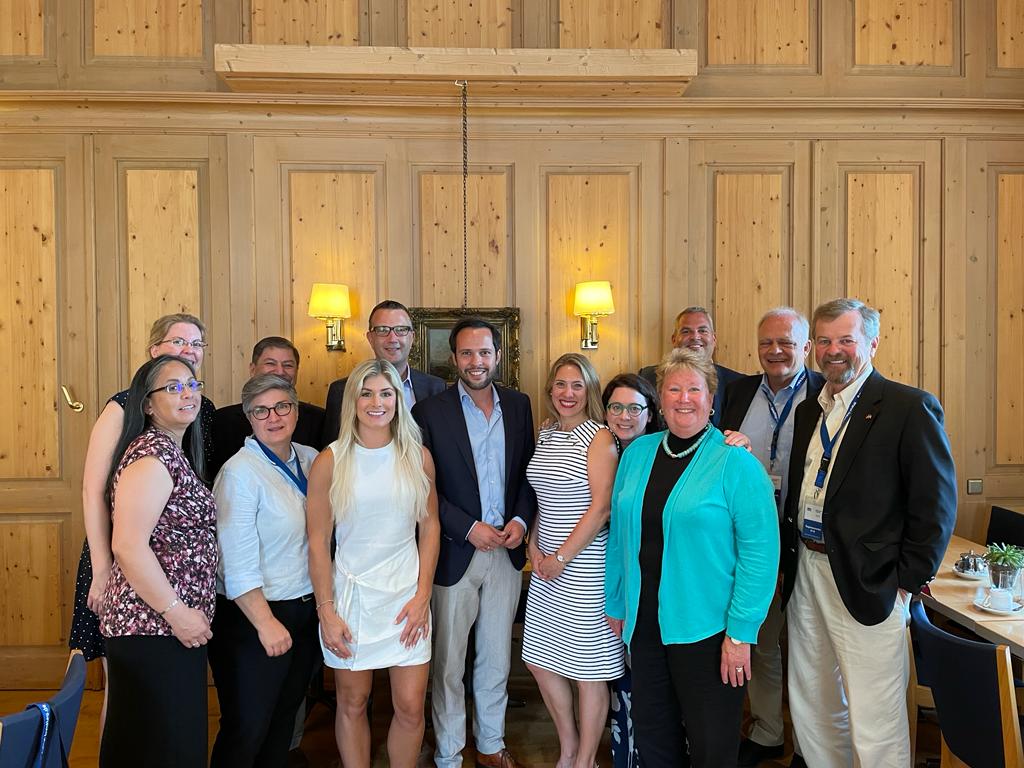Study Tour
Transatlantic Dialogue Political Professionals Study Tour

The FNF Transatlantic Dialogue (TAD) conducted its annual study tour program from June 18th-25th. This year’s program saw participants exploring the political, cultural, and economic landscapes of Upper Bavaria, Munich, and Berlin, and focused itself around the motto “Germany’s Political and Economic Landscape in Times of Zeitenwende”. The professional expertise of the participants ranged from industry to government affairs.
The tour began in Munich, and focused on state-level affairs (ahead of the elections this Fall) and the challenges faced by Germany’s current governing coalition. Owing to Munich’s historical character, participants started on Sunday, June 18th with a guided walking tour of Munich’s downtown, highlighting the city’s past during the years before National Socialism.
The group then traveled south to the small town of Miesbach and met with Ursula Lex, CEO of Lex Inc., a small, family-owned, yet highly specialized machining company. During their meeting with Lex, participants received an in-depth view into a small operation which many would regard as representative of Germany’s so-called “Hidden Champions” (Mittelstandsunternehmen). Lex provided insights into the challenges facing companies like hers in times of high inflation, labor shortages, and competition with China. In her capacity as a local politician, Lex discussed the political realities on the communal level, highlighting difficulties in voter outreach in an arena dominated by the CSU. Participants then visited Lake Tegernsee, a region noted for its prevalence of eco and health tourism. Providing further insight into this, participants met with Georg Seitz, president of the local mountain shooters organization and former chef and owner of the Kreuzstraße Gasthof on Lake Tegernsee.
Returning to Munich, participants visited the Bavarian Headquarters of the Free Democrats (FDP), with presentations provided by Frederic Schneider, Campaign Manager for the Bavarian FDP, on the party’s campaign strategy for the upcoming state elections. Participants later met with Martin Hagen, the party’s chairman and member of the state legislature, who introduced the group into the Bavarian political system and current developments.
The group concluded the Munich portion of their tour at the BMW Classic Group, where they were met by Benjamin Voß, Head of BMW and MINI Club, who discussed the history of BMW in Bavaria and its status as one of Germany’s world-renowned car manufacturers.
During the Berlin component of the tour, participants had the opportunity to engage with policy and decision makers in different arenas, including within the Chancellery, Foreign Ministry (Auswärtiges Amt), and media.
The group first met with Iris Fröba and Daniel Djaziri at the FDP’s federal headquarters, where they discussed national campaign strategy. This was followed by a meeting with Torsten Herbst, MdB, who discussed some of the working dynamics of the “Traffic Light” (Ampel) coalition. Following this, the group was received by Michael Link, MdB, who was recently named Transatlantic Coordinator for the Federal Republic of Germany. Link addressed key issues in German-EU and German-US relations, as well as the ongoing policy debate surrounding the war in Ukraine.
Later that same day, the participants had the honor to have been hosted at the annual Sommerfest of the German Parliamentary Society (DPG), where participants encountered familiar faces, such as Parliamentary Caucus Leader, Christian Dürr, MdB, among others who have been hosted in Washington by the FNF North American Regional Office.
To conclude this year’s tour, participants engaged in meetings at the WELT Group, guided by foreign affairs editor, Jens Wiegmann, followed by a meeting at the Chancellery with Dominik Bohnen, Deputy Division Head, Non-Proliferation and Arms Control, Bilateral Relations with the States of North America, Northern, Western and Southern Europe, and Turkey. With Mr. Bohnen, participants largely discussed foreign policy issues, ranging from the war in Ukraine to Germany’s stance towards China.
Over the course of this year’s tour, participants and organizers alike had the opportunity to reflect on more than 15 years of the tour’s standing, as well as decades-long participation in the TAD network. With this, we hope to continue to promote an active and engaged Transatlantic exchange, and maintain our small contribution towards a more interconnected and cooperative global community.
The FNF North American Regional Office would like to once more thank the participants for their years of dedication and commitment to the TAD project, and for the wonderful and informative experiences of this year’s trip.